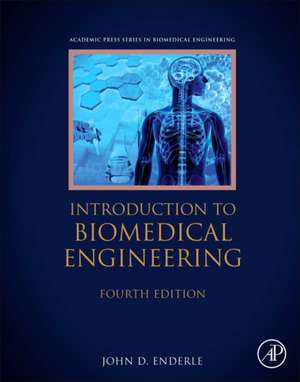Introduction to Biomedical Engineering: Biomedical Engineering
Autor John Enderle, Stanley Dunnen Limba Engleză Hardback – 2026
- Features revised and updated chapters throughout on current research and developments in biomaterials, tissue engineering, biosensors, physiological modeling and biosignal processing
- Contains more worked examples and end-of-chapter exercises than previous editions
- Provides a historical look at the major developments across biomedical domains and covers the fundamental principles underlying biomedical engineering analysis, modeling and design
- Includes online bonus chapters on rehabilitation engineering and assistive technology, genomics and bioinformatics, and computational cell biology and complexity
Din seria Biomedical Engineering
- 22%
 Preț: 450.88 lei
Preț: 450.88 lei - 23%
 Preț: 619.56 lei
Preț: 619.56 lei - 35%
 Preț: 557.07 lei
Preț: 557.07 lei - 23%
 Preț: 794.10 lei
Preț: 794.10 lei - 5%
 Preț: 808.68 lei
Preț: 808.68 lei - 11%
 Preț: 629.79 lei
Preț: 629.79 lei - 23%
 Preț: 549.27 lei
Preț: 549.27 lei - 22%
 Preț: 605.36 lei
Preț: 605.36 lei - 29%
 Preț: 868.53 lei
Preț: 868.53 lei - 8%
 Preț: 423.60 lei
Preț: 423.60 lei - 30%
 Preț: 782.99 lei
Preț: 782.99 lei - 25%
 Preț: 690.65 lei
Preț: 690.65 lei - 21%
 Preț: 339.72 lei
Preț: 339.72 lei -
 Preț: 379.25 lei
Preț: 379.25 lei -
 Preț: 447.05 lei
Preț: 447.05 lei - 18%
 Preț: 560.53 lei
Preț: 560.53 lei - 18%
 Preț: 953.44 lei
Preț: 953.44 lei - 18%
 Preț: 967.93 lei
Preț: 967.93 lei - 18%
 Preț: 1292.62 lei
Preț: 1292.62 lei - 15%
 Preț: 585.30 lei
Preț: 585.30 lei - 26%
 Preț: 1161.10 lei
Preț: 1161.10 lei -

Preț: 1160.05 lei
Preț vechi: 1221.11 lei
-5% Nou
222.01€ • 230.92$ • 183.28£
Carte nepublicată încă
Specificații
ISBN-10: 0128096357
Pagini: 1200
Dimensiuni: 191 x 235 mm
Ediția:4
Editura: ELSEVIER SCIENCE
Seria Biomedical Engineering
Public țintă
Senior undergraduate and graduate level students of biomedical engineering and related courses in biological & life sciences and chemical, mechanical and electrical engineering.Cuprins
1. Biomedical Engineering: A Historical Perspective
2. Moral and Ethical Issues
3. Anatomy and Physiology
4. Biomechanics
5. Biomaterials
6. Tissue Engineering
7. Compartmental Modeling
8. Biochemical Reactions and Enzyme Kinetics
9. Bioinstrumentation
10. Biomedical Sensors
11. Biosignal Processing
12. Bioelectric Phenomena
13. Physiological Modeling
14. Biomedical Transport Processes
15. Radiation Imaging
16. Medical Imaging
17. Biomedical Optics and Lasers
Descriere
Introduction to Biomedical Engineering, Fourth Edition is a comprehensive survey text for biomedical engineering courses. It is the most widely adopted text across the BME course spectrum, valued by instructors and students alike for its authority, clarity and encyclopedic coverage in a single volume. Biomedical engineers need to understand the wide range of topics that are covered in this text, including basic mathematical modeling, anatomy and physiology, electrical engineering, signal processing and instrumentation, biomechanics, biomaterials science, tissue engineering and medical and engineering ethics. The authors tackle these core topics at a level appropriate for senior undergraduate students and graduate students who are either majoring in BME or studying it as a combined course with a related engineering, biology or life science, or medical/pre-medical course.
- Features revised and updated chapters throughout on current research and developments in biomaterials, tissue engineering, biosensors, physiological modeling and biosignal processing
- Contains more worked examples and end-of-chapter exercises than previous editions
- Provides a historical look at the major developments across biomedical domains and covers the fundamental principles underlying biomedical engineering analysis, modeling and design
- Includes online bonus chapters on rehabilitation engineering and assistive technology, genomics and bioinformatics, and computational cell biology and complexity
